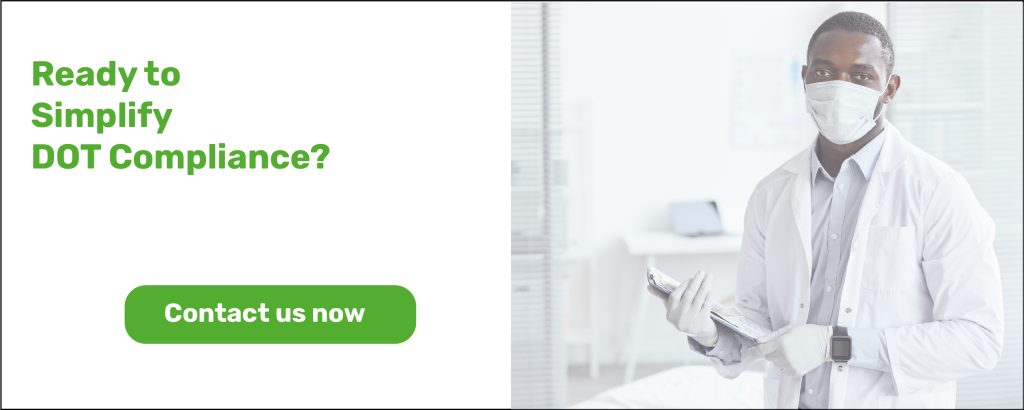When it comes to USDOT (Department of Transportation) regulations, there are a lot of aspects that businesses need to be aware of in order to remain compliant. One crucial aspect is the Drug and Alcohol Requirements. In this blog, we will dive deep into the role of Consortium and Clearinghouse in ensuring compliance with these requirements. Why is compliance so crucial? Who does it apply to? We will also break down the key aspects of the USDOT Compliance Program related to drug and alcohol testing. Additionally, we will explain how a consortium can aid in USDOT compliance and answer any questions you may have about audits, programs, and more. Whether you’re a transportation company or an individual driver, understanding these regulations is vital for keeping your business running smoothly.
Understanding the Role of Consortium and Clearinghouse in USDOT and FMCSA Regulations
In the world of USDOT and FMCSA regulations, Consortiums and Clearinghouse play crucial roles in maintaining compliance.
A consortium is a group of transportation companies that pool their resources to meet the USDOT drug and alcohol testing requirements. It allows smaller businesses to have access to affordable testing services and comply with the regulations effectively.
On the other hand, Clearinghouse is an online database that stores information about commercial drivers’ drug and alcohol violations. It helps employers and enforcement agencies ensure that drivers are compliant with USDOT regulations by conducting thorough checks before hiring or allowing them to operate commercial vehicles.
Consortiums and Clearinghouse are crucial for USDOT compliance, managing drug and alcohol test results, and storing violations. They provide services for random drug testing, reasonable suspicion testing, and post-accident testing. Clearinghouse assists employers, medical review officers, state driver licensing agencies, and CDL drivers.
Why Compliance with USDOT Regulations is Crucial?
Complying with USDOT regulations is essential for ensuring safety in the transportation industry. It helps prevent alcohol and substance abuse-related incidents among CMV drivers. Non-compliance can result in penalties, fines, and even CDL suspension. Adhering to regulations safeguards the trucking industry’s reputation and promotes public safety by ensuring CMV operators are fit for duty, reducing the risk of accidents.
Who Does It Apply To?
USDOT drug and alcohol requirements apply to employees in safety-sensitive transportation jobs, such as commercial drivers, pilots, railroad workers, and certain positions at pipeline companies. Employers are responsible for ensuring compliance to avoid fines, penalties, and loss of operating authority.
Decoding the USDOT Drug and Alcohol Requirements
USDOT drug and alcohol requirements, outlined in 49 CFR Part 40, aim to prevent substance abuse in safety-sensitive transportation roles. The regulations mandate drug and alcohol testing, including specimen collection
and review by medical review officers (MROs). Employers and service agents oversee testing programs, reporting results through the FMCSA clearinghouse.
Who is Subject to these Requirements?
The requirements apply to individuals holding commercial driver’s licenses (CDL) in safety-sensitive transportation positions. Compliance with drug and alcohol testing regulations is necessary for those working in trucking, public transportation, school bus operations, and other commercial motor vehicle operators. Commercial vehicle operators and transportation companies must adhere to FMCSA regulations.
Key Aspects of the USDOT Compliance Program
The USDOT compliance program covers drug testing, alcohol testing, and management of drug and alcohol testing data. It emphasizes the importance of maintaining compliance with federal regulations and enrolling CDL holders in the DOT Clearinghouse. Employers must report drug and alcohol violations and conduct queries in the Clearinghouse for timely compliance.
How Does a Consortium Aid in USDOT Compliance?
A Consortium plays a crucial role in USDOT Compliance by offering drug and alcohol testing program administration services. It provides resources, expertise, and support for creating and maintaining compliant programs. Consortiums enable small transportation companies to fulfill their obligations and streamline compliance with FMCSA regulations.
Enroll your company in drug and alcohol Testing Services consortium and Clearinghouse to ensure compliance with USDOT regulations.
Enroll your company in drug and alcohol consortium and Drug and Alcohol Clearinghouse for seamless compliance with FMCSA regulations. The Consortium offers enrollment, random testing program management, and drug testing services. The Clearinghouse facilitates queries, reporting, and monitoring drug and alcohol violations.
Questions about USDOT Compliance, Licensing, Audits, Programs, etc.?
Looking for answers about USDOT compliance, audits, or drug and alcohol testing programs? We’ve got you covered. Our specialists provide comprehensive guidance on enrollment, Clearinghouse queries, testing services, and Compliance requirements. Get your queries addressed and ensure adherence to FMCSA regulations.
Conclusion
Understanding and complying with USDOT drug and alcohol requirements is crucial for the safety and well-being of everyone involved. It is important to educate yourself on the role of consortiums and clearinghouse in these regulations, as well as to whom these requirements apply. By enrolling your company in a Consortium and utilizing the services of a DOT specialist, you can ensure that your organization is fully compliant.
Don’t hesitate to reach out with any questions or concerns you may have about USDOT compliance audits, or programs. We are here to help you navigate the complexities of these regulations and ensure the highest standards of safety and Compliance in your operations.


